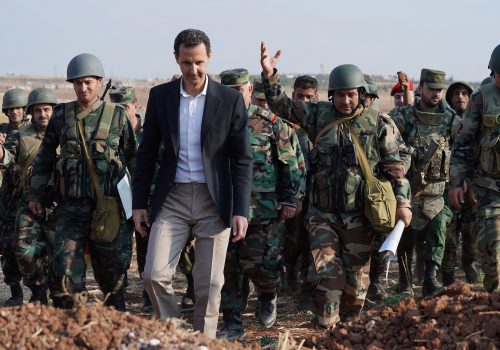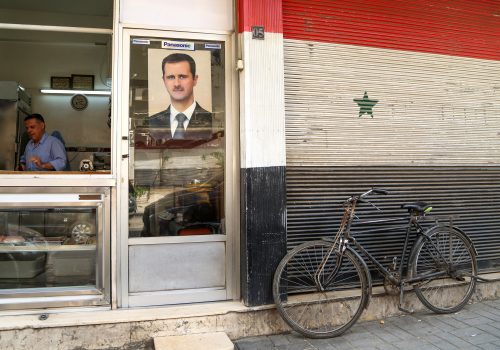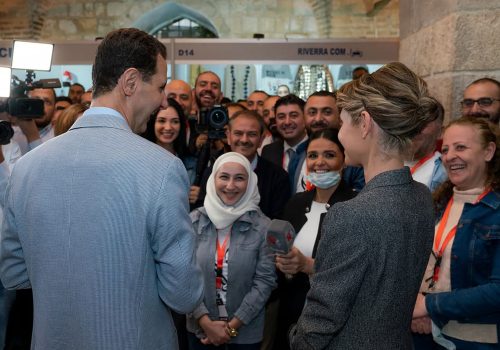Don’t rely on Moscow to help with “reconciliation” in Syria’s Daraa province
Daraa, Syria’s southern province, is an anomalous government-held territory. Unlike the regime’s other reconciliation deals struck in 2017-2018, Damascus and Russia agreed with rebel and local leaders to permit local control in exchange for opposition forces disbanding their forces, surrendering heavy weapons, and permitting a limited return of state-provided services.
Despite over 425 recorded violent incidents in Daraa since 2018, the deal loosely held. However, it began to crumble in the second half of 2020. It verged on collapse this January, when the Syrian regime claimed that the Islamic State of Iraq and al-Sham (ISIS) and al-Qaeda affiliate Hurras a-Din sleeper cells conducted several assassinations against its personnel in Daraa. Local notables rebuffed this as a pretext for Russia and the regime to reassert total control over southern Syria. Their assertions were seemingly confirmed in January, when the Syrian Arab Army (SAA) prepared for an offensive operation to reconquer the area, only shelving that plan after Russia had extracted more concessions for Damascus from local leaders.
The regime and Russia’s advances in Daraa are unsurprising. Unable to make rapid military advances in northwest or northeast Syria, Russia is swiftly attempting to progress its two overall goals in the country: assisting the Bashar al-Assad regime in reasserting control over all of Syria while claiming to international audiences—particularly Israel and Jordan—that Moscow can still guarantee their security interests. Both Syrians and the international community must not fall for this. Any deal Russia strikes in Syria’s south will be volatile and temporary, given that resolving underlying conditions are impossible under the regime and Russia’s direction.
The 2018 Daraa deal
When the Syrian regime set out to capture Daraa in June 2019, it operated according to a pattern employed elsewhere in the country: initiating ground offensives, coupled with indiscriminate Russian aerial bombardment, aimed at sieging targeted territory. When locals and rebel leaders agreed to surrender, Russia would intercede to evacuate all rebels to north Syria and restore total regime authority. This happened in Aleppo in 2016, al-Waer in Homs province in 2017, and Eastern Ghouta, a Damascene suburb, in early 2018. These coercive agreements served the Assad regime’s interest in capturing opposition-held territory and allowed Russia to establish itself as the mediator over Syrian affairs.
However, the Daraa agreement differed. It divided the province into two domains: one under full regime military authority and another mostly in Western Daraa, along the Israeli and Jordanian borders, and guaranteed by Russia. The latter reintroduced partial regime authority while permitting a degree of local autonomy, with only limited rebel evacuations to Idlib province. Instead, the deal included “settlement” for military service-evaders and integration of rebels into the SAA’s Russian-backed Fifth Corps. Russian military police and the Eighth Brigade, composed of ex-rebels and operating as part of the Fifth Corps, would provide security.
Moscow acknowledged Daraa’s complex reality by permitting opposition forces to remain. When the opposition controlled Daraa, ISIS and al-Qaeda elements operated throughout the province—particularly in the Yarmouk Basin—challenging rebel authority. Russia conditioned its support of the 2018 deal on surrendering rebel forces aiding in counter-ISIS operations. This allowed Moscow to expand its role in Syria to managing Daraa and buttressing its presence near the borders with Israel and Jordan. This calmed the Israelis in particular, who were concerned over Iranian and Hezbollah entrenchment. It also situated Russia as the relative security guarantor.
An eroding deal
Between July 2018 to March 2020, Daraa witnessed more than sixty protests, signaling discontent with the regime’s unfulfilled promise to release detainees and prevent further arrests by security forces. Deterioration of humanitarian conditions, following the expulsion of non-governmental-affiliated humanitarian charities that existed when the area was under opposition control, replaced weak and sparse government-provided services and fueled discontent. Rising lawlessness—including regime retaliatory assassinations, clashes, and kidnappings, as well as between members and opponents of the reconciliation deals—became a pretext for the regime’s military intervention. Damascus also claimed that it wanted to eliminate ISIS sleeper cells, whose size and strength is disputed, despite regime assertions that they constitute a significant threat.
Throughout 2020, the SAA’s Fourth Division repeatedly threatened to attack several cities—including Tafas, Tell Shihab, an al-Karak al-Sharqi—if they didn’t surrender local ISIS cells and quell internal violence. Assassinations—claimed by ISIS—of regime officers in December 2020, including the killing of a lieutenant colonel and five soldiers in the town of al-Sahim, were the final straw. In early February, meetings between Fourth Division and Daraa’s locally selected central committee were immediately set up to stymie a looming military offensive. The negotiations resulted in increased checkpoints, arrests, and further surrender of medium-sized weaponry. While the deal assured locals that individuals identified as fugitives by the regime would not be sent northward to Idlib, locals were required to leave western Daraa and provide assurances from tribal leaders that they would not return.
For the Assad regime, the 2018 deal was meant to be a temporary measure, as it allowed only its partial return to the south. However, Daraa’s current hybrid-governance model poses a long-term threat. Localized governance will only increase resistance to Assad’s intended return the longer it is allowed to endure. The regime’s security objectives require it to seek any opportunity to expand its reach in Daraa. Therefore, the Assad regime appears intent on periodically escalating tensions to continuously modify the province’s reconciliatory terms in its favor and, ultimately, overturn them to reassert full control.
Russian objectives: Chief broker
Russia also wants to reassert total regime control over all of Syria and remain the chief broker and leader negotiator on the country. Nevertheless, the reality is that Russia cannot deliver any long-term assurances inside of Syria; moreover, its credibility as an international broker in Syria has consistently declined over time.
While Russia has delivered some short-term pledges to Syrians through settlement deals and negotiations, underlying conditions for instability are not expected to change and Russia has no intention of resolving them. The 2020 protests of Sweida are one such example. There, protests that erupted in the Druze-majority province over economic hardships and disappearances of activists finally ended when Assad phoned Druze spiritual leader Bahjat al-Hijri, distancing himself from insults directed at the cleric by Brigadier General Louay al-Ali, the Head of Military Intelligence in Sweida.
This call—and the subsequent calm in the province—engineered by Russia showcased Moscow’s unique ability to quickly quell discord in restive areas. However, economic conditions in Sweida have not improved and the constant tension between the semi-independent province and the central government are unlikely to improve in the future, meaning that Russia’s negotiations can only delay and not prevent future confrontations.
Similarly in Daraa, from 2018-2020, Russia had maintained a position of limited intervention in the provision of humanitarian and governance services in the area to signal to the regime that it could not enforce deals without Russia’s strong patronage. But, as in the case of Sweida, the engineered deals brokered by the Russians temporarily addressed chaos and dissatisfaction in Daraa with brute force and increased military domination by Russia and the regime. Once again, both have ignored the root causes of the discontent.
Russia has also attempted to position itself as an international security broker, but Moscow’s ability to deliver should be viewed skeptically. The Jordanians have sought Russian assurances to control drug smuggling from Syria into Jordan as well as chaos on its sensitive border. But the Jordanians continued attempts to negotiate with Russia to keep Iran-backed groups away from its border show no proof that such discussions have led to tangible results.
Israel also attempted to rely on the Russians, only to quickly realize that doing so would not satisfy Israeli national security concerns. Shortly after Russia militarily intervened in Syria, Israel—which had been operating against Lebanese militant group Hezbollah in Syrian skies for at least two years against—agreed to a “deconfliction mechanism” with Moscow to avoid inadvertent military clashes. Initially, this mechanism’s success and Russian-Israeli coordination led Israel to believe that it could ask Russia to distance Iranian forces from the Israeli border after the Assad regime retook southern Syria. Those talks eventually broke down after the Israelis recognized Russia’s undependability.
Now, even though Russia and Israel continue discussions on Syria, the Israelis have refused to subcontract their security to the Russians, recognizing their limited sway over Iranian forces. Recent months have seen the Israelis ignore Russian Foreign Minister Sergey Lavrov’s request that Israel “inform Moscow of Iranian threats, not bomb them,” conducting almost weekly airstrikes on Hezbollah and Iranian assets in various parts of Syria.
Moving forward
In the short term, Russia will likely try to assure regional countries of its ability to stabilize southern Syria. Moscow’s reliability, however, is dubious.
Furthermore, the regime’s continued harassment, arbitrary arrests, enforced disappearances, and assassinations will maintain the preconditions for a future eruption. Syria’s overall deteriorating living conditions, combined with complications specific to Daraa, leave open the possibility that the southern province could devolve into renewed clashes. Under these conditions, neither Jordan nor Israel—nor any other actor with serious security concerns at stake—should depend on Russia to permanently guarantee southern Syria’s relative quiet. If precedent is any indicator, Russia is both unwilling and unable to maintain these assurances indefinitely.
Jomana Qaddour is a nonresident senior fellow with the Rafik Hariri Center and Middle East Programs, where she leads the Syria portfolio. Follow her on Twitter: @jomanaqaddour.
Abdulrahman al-Masri is a nonresident fellow with the Rafik Hariri Center and Middle East Programs. Follow him on Twitter: @AbdulrhmanMasri.
Image: Russian President Vladimir Putin, Defence Minister Sergei Shoigu and Syrian President Bashar al-Assad attend a meeting in Damascus, Syria January 7, 2020. Picture taken January 7, 2020. Sputnik/Aleksey Nikolskyi/Kremlin via REUTERS


